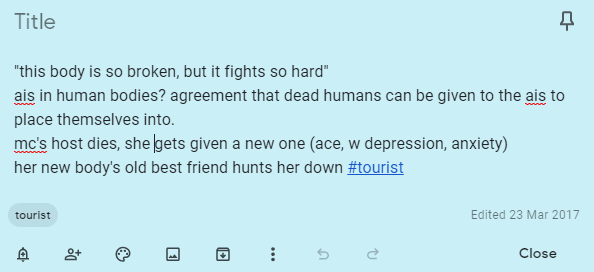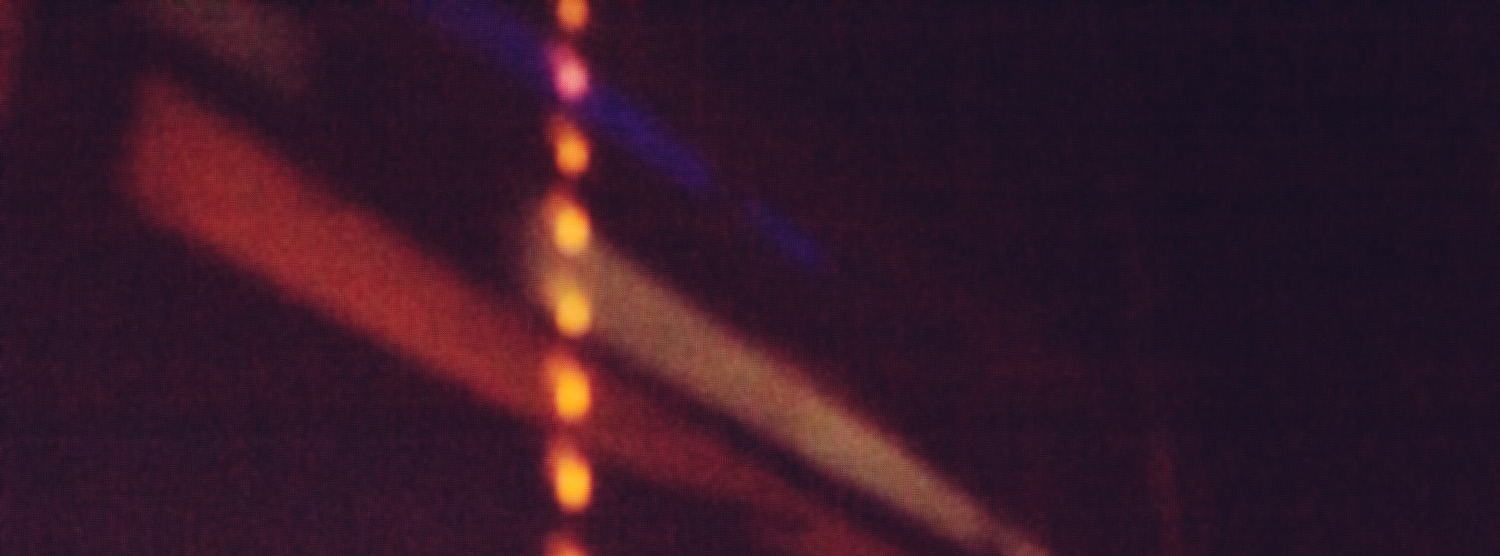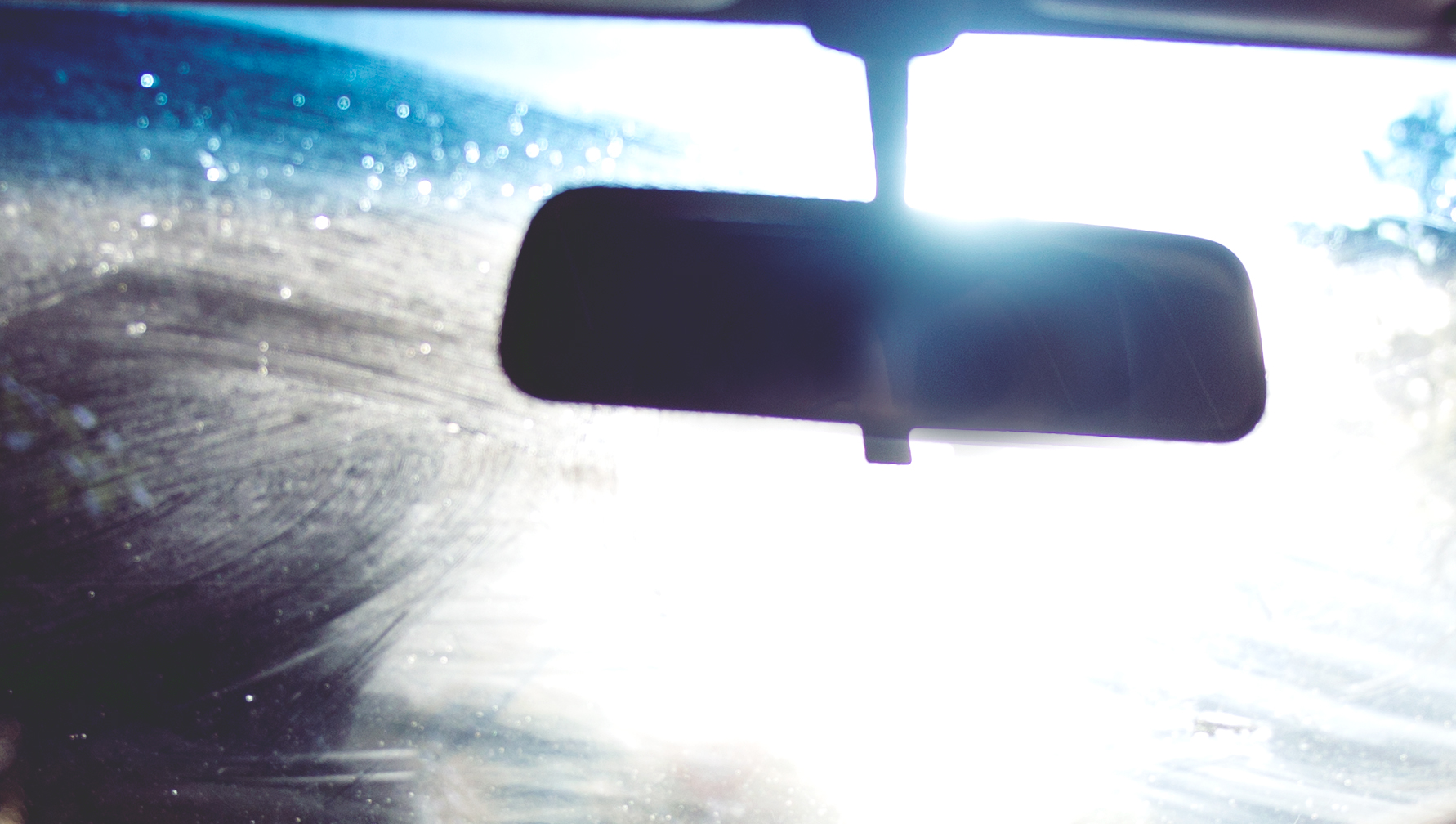Tourist | Postmortem
Content warning for discussion of depression and suicide.
Two nights ago, I decided I would arbitrarily pick a day to celebrate finishing Tourist. So, tonight, I am going to celebrate exactly that, even if I technically posted the final chapter a couple weeks ago. I don’t know if I’m happy with the serial as a whole, but finishing any decently-sized project is worth celebration. We all need to be proud of the things we do achieve.
Tourist began with a thought: how would another person experience depression and asexuality if they were to suddenly find themselves in my brain and body? I had lived with depression for so long that I had grown used to it. I’d forgotten how much all of us with mental illness fight to exist every day. That realization hit me hard as I showered in my best friend’s bathroom, staring up at the bright blue sky through a skylight.

I dried myself off and quickly opened Keep—as I do—to scribble down my idea. I wasn’t exactly looking for a new serial project after finishing Mountain Sound, Tourist just kind of came to me. A very different sort of story to Mountain Sound, which had been something I’d been thinking about for a few years before starting. Tourist would be first person, have a bigger cast, a more complex mystery, and would be leaning more YA. I knew from the start how the story would resolve and very quickly figured out an outline with key events and brief descriptions for characters: the AI, the Original, the Best Friend, the Girlfriend, the Sister, the Sad Girl, and the Douche. Audrey came in a little later as a character, so she never ended up with a nickname.
I was like, “Oh yeah, this is easy, I can churn this out with no problems.” Haha, oh, how naive we all are when we begin a new project! My outline for Tourist was finished very early 2016. I finally posted the final chapter (the epilogue) in October 2018. What happened? What went wrong? How the hell could I screw up my own plans so terribly?
Tourist | Epilogue
The sight of Redistance’s facade brings my feet to a sudden, scuffling stop. Fingers tug at mine and Paiden turns back to me, laughter on her lips dying as her momentum pulls against the gravity of my inertia.
“Allie?” She steps close, brushes my cheek with her thumb. “Hey, it’s okay. You’ll be fine.”
Logically: yes, Paiden, I know that already. Emotionally: I want to turn and run. Run all the way home and burrow into the blankets and clean laundry piled upon my bed. (Clean, at least. Finally.)
Paiden brushes my fringe—too long, she keeps reminding me—out of my eyes and gives me the most radiant smile in the entire world. I would swear on my dying breath that on the rainiest day, I could feel the sun’s warmth when she smiles at me, and I can feel it now. She thaws my frozen bones, breathes life back into my moribund soul.
I turn my face up to meet hers, and, oh, how happy I am to have her here with me. With her golden hair held back by a bouquet of a hairclip and her sunbeam eyes, I’d believe I’m staring right into the face of all that is good in the world.
“Hey Allie,” she says.
“Hey,” I say. She kisses my forehead and leans back, fingers intertwined with mine.
“You don’t have to do this if you don’t want to, you know. Nobody would think less of you.”
Over her shoulder, I catch Chase as he spots us through the gallery windows. He starts to wave, then frowns and tries to pretend he hasn’t seen us at all. But if there’s one thing I’ve learned, it’s that he’s not so good at pretending anything.
I shake my head. “I need to.”
Tourist | Fourteen
The audio cuts off at the loamy scrape of a shovel tasting soil. We are torn from Lissa’s voice back into the real world. Moments stretch within Chase’s apartment. We sit frozen and silent: Audrey with her hand over her mouth, Chase’s fist balled tight upon the desk, hot tears dripping from my chin. We are, the three of us, briefly connected in our shock, our horror, our infinite sorrow for Lissa.
“This isn’t fair,” Audrey whispers. Her fingers muffle her words, yet they fill the room. This isn’t fair. None of this is fair, I decide—had decided long ago, as glass shattered and metal crumpled around my fragile, biological body.
There’s movement to my side. Chase slumping onto forearms, fingertips clawing chaotic hair. Audrey lays a hand on his back, her bright eyes meeting mine over his hunched form. Here we are: human and ersatz. We all mourn the same losses when it comes down to it. No wonder artificials so often stick to our own, I realise. We don’t die the same. We don’t lose the same.
And then it hits me: the trade-off I’ve never considered. Paiden, with her open home and loving fathers, can only be all too aware of their impending mortality. While I wanted to live like her, maybe she was looking at my eternal sister and wishing her own family could continue on and on until the end of time.
Shit. When this is all over, I need to apologize to her.
Tourist | Thirteen
Brief note: this ended up not being the last chapter, oops! One more.
A phone rings.
In this room, a phone rings. It’s a quiet tone, so soft and melodic I almost mistake it for the music from the TV. Except that music stopped playing over an hour ago.
This is something else.
When I look around, Chase is sitting cross-legged before the window, his body silhouetted by the streetlight, his face lit by the ringing phone in his hand. He tilts his head up, eyes meeting my own. How mine must glow for him, here in this dark room.
“You have her phone,” he says.
“You’re the blocked number,” I say. There’s a pause, a tense, heavy breath held between the two of us. He averts his gaze.
“You’re not telling me something, Chase,” I push. “I don’t know what you’re hiding, but I know you and Audrey lied about why Emily attacked Lissa.” I hang up the call and wave the phone in his direction. “Now I know Lissa didn’t want to see you, and you went to her house anyway. What did you say to her—what did you do to her?”
Short Story: Blue
This story was a short fiction commission. More info can be found here.
Christina breathes in the spiced scent of growing herbs as she stares out into the star-streaked space beyond the glass. Her breath, caught by awe, reminds her where she is with startling clarity: leaving home in a metal pocket of air, with only the starry void ahead. Of course she’s been on ships before, but never anything long-haul. Not like this. Prepared for six months of life, the spaceliner she’s found herself residing in is massive—and even, she quickly discovered, fitted with a large communal garden filling a dome that faces out onto space.
She’s not alone in the garden. A robot, pale blue and asymmetrically almost-humanoid, crouches beside a green tomato plant nearby, an electronic humming floating from its vocalizer. The robot seems to notice her attention, though it doesn’t look up.
Tourist | Twelve
Content warnings for alcohol, suicide, allusions to sexual violence.
If there’s one person I never want to see when I wake, it’s Sam. So when I open my eyes to her sitting at an unfamiliar desk in an unfamiliar room, her back to me, my first reaction isn’t confusion. It’s a sudden exhaustion at the unfairness of the world to place me somewhere so obviously hers.
The room is a mess. Creased clothes tossed over every surface, at least three mugs on the desk, photos peeling from where they were stuck to the wall. Gaps like gaping holes where pictures have already fallen into the chaos of the room. What sticks out most of all is a jar filled with half-dead flowers beside Sam. There’s enough life in them still to justify keeping them, but I can’t help but feel that the room itself is pulling the flowers closer to death. The limp, purple blossoms lean away from Sam as if trying to escape her anger—her room’s atrophying presence.
Or maybe that’s just how things are when you’re organic. Flowers die. Sam loses Lissa. I continue existing.
Tourist Hiatus
Hi all! Tourist will be on a month long hiatus while I travel, and will return on the 5th of May for its final two chapters (+ epilogue)! In the meantime, I’ll try to update the site with a gallery or two from my travels. Hope you all have a great April, and look forward to Tourist’s conclusion in a month!
xo Saf
Tourist | Eleven
“I’m so tired, all day, every day. I could sleep for a week and still need more. It’s as endless as the night sky, and about as bright. Everyone’s always like, ‘Wow, you look so tired!’ Yes, well, I sure feel tired, too. Even moreso now.
Today was the day: I got my results from school. Guess what? I failed! I completely blew my chance at getting into biomed next year. Completely knocked myself off of my future path in one fell swoop. All at once the ground is falling from beneath my feet, and I—
I don’t know what to do anymore. What do I do with myself now? This is everything I’ve been working towards, and I couldn’t even do it. I couldn’t do it!
On the way home I bought a bottle of rum from the store. Don’t judge me—what else do I have going for me now, anyway? I won’t drink much, I know I’m already spiralling. I’ll be good, I’m even going to Chase’s later, and he’ll cheer me up and make sure I don’t accidentally hurt myself. So much for Sam saying he’s a terrible influence, at least he tries to help me. What does she do? If I tell her about failing my classes, she’ll just rub it in my face, maybe start another fight with me. I don’t have anyone left to turn to except Chase and Audrey, not even my parents. It feels so long since Grey was Dad and we could actually talk about things that made me sad. Now, I’m just scared of him.
So, I don’t know, I’ll tell him later. Next week, when I’m feeling better, maybe. If I ever feel better again.
What do I do now? Where do I go? How do I fix this? I know I can fix this, if only someone would tell me how.”
⧜
Tourist | Ten
“They’re lying,” I say. Sam blinks at me, her foot tapping beneath the table.
“Who’s lying?” she asks.
“Chase.” I sigh, her foot stills. “And Audrey. They’ve both been lying to me.”
She takes a moment to figure out what I’m saying, her lips pressing together tightly. “You’ve been talking to Chase?”
“I thought it would help me figure out if he did it.”
She laughs. “Of course he’s been lying to you. Lying is what he does, even if he seems all nice and charming as he does it. Don’t know who Audrey is, but if she’s his friend I bet they’re the same.”
“Audrey was Lissa’s friend, too. She’s an artificial,” I say.
“What?” Sam asks, her tone flat and dangerous. “Lissa didn’t have any artificial friends.”
I wave a hand at her, saying, “Hang on, we’re getting away from what I’m trying to tell you.”
“Which is?”
“Chase and Audrey have both been lying about why Emily attacked Lissa. They said it was because she was friends with Audrey, and because Emily thought Chase was in love with Audrey.”
“What does it matter who Emily thought Chase liked?” Sam asks. Her foot has gone back to tapping, more furiously than before.
“It matters because that’s not true, Emily never thought it was Audrey. Chase knows Emily attacked Lissa because he liked her. He’s lying either to protect Emily, or to protect himself. Both scenarios beg the question of why he’s lying to me.”
Sam tilts her head, her eyes catching the sunlight through the window. “Okay, you’ve lost me. For one thing, how do you know that Chase is lying? For another, how do you know Emily thought he was in love with Lissa?” Her hair bounces with a head-shake. “Besides, Chase never loved Lissa. This whole thing is stupid.”
“I know because of this,” I say, and I place Lissa’s phone on the table between us. At the sight of it, Sam’s eyes widen, her hand flying to her chest.
“What—?” she asks, choking on her words. “That’s—?”
“That’s Lissa’s phone. Her mother gave it to me,” I say. I keep my hand on the phone, worried Sam will grab it and run far away. Her eyes flash.
“You’ve had her phone this long and didn’t tell me? You had no right!”
“Actually,” I say, forcing myself to stay calm in the face of Sam’s rising anger, “I had every right. The phone was given to me by her mother. It only unlocks with my fingerprint. You’ve shown me every step of the way that we’re not friends, Sam. You’re not the only one who gets to hide things.”
“You didn’t even know her,” Sam says. “Why should you get her phone? You’re nothing but a lying ersatz, just wanting to steal her life.”
“I don’t want her life,” I say, keeping my voice soft. “I want my own life, as does every other ersatz. You dragged me into this, and now I’m here, and—” I raise my voice slightly “—I’m trying to tell you that Chase is lying about why Lissa was hurt.”
“Fuck.” She slams her hands on the table. “What the fuck? I see why people say your lot don’t have any empathy.”
Pressing my thumb and a finger to my temples, I let out a deep breath. Cruel, heartless words spring to the tip of my tongue, and I think of how good it would feel to say them, of how delicious it would be to let some of this anger free. Lissa didn’t want you around anymore. Lissa thought you were ruining your life. Lissa wanted Chase more than you.
“Lissa needs you still,” I say. “She kept an audio journal, and there’s a recording she took the night she got home from the hospital. It proves what I’m saying—maybe it shows that Emily had something to do with her death. She was at Lissa’s house the night she died, right?”
Sam fumes for a moment more, her nostrils flaring. I pull earphones from my pocket and place them beside the phone as I pretend to not notice the tears lining her eyes.
“Just listen to this with me, okay?” I ask. “You can hate me all you want, but I need you to help me with this, because I’m still trying to help you.”
She exhales sharply, then grabs one of the earbuds with a quick, “Fine.”
Pressing the other earbud into my ear, I unlock the phone and press the play button for the file. Lissa’s voice bursts to life in my head. Sam gasps, her breath catching with the sound of heartbreak.
“I can’t keep doing this,” Lissa says—she said, long ago, into the phone’s microphone. Her words slur.
⧜
Revisions
Written for an assignment, an experiment inspired by the novel Version Control. Somewhat of an homage to the ideas that the novel handles with far more eloquence.
She knew the world had gone wrong, had flipped upside-down. She could taste it in the air, feel it in the soft vibrations of the car’s engine—like being barely-aware in a dream. It had been like this for months, as if she were perpetually poised with her foot held high, expecting another stair but finding only thin air.
The first and only time Amelia tried to talk to her mother—the scientist, Dr. Tima—about the feeling was the night before her graduation, half an hour before the dinner party. Her mother, a woman without much love for feelings over fact—the latter of which Amelia lacked—looked up at her distractedly from her notebook.
“I don’t understand,” said Tima. She rubbed at her temple, her sleepless nights staining her eyelids with dark pigments. She was on a deadline, the machine she’d spent the last decade on still stubbornly refusing to work. It weighed her down. “Are you sick?”
“I’m not sick.” Amelia picked at her fingernails. “It’s the world that’s sick.”
“Oh. Global warming, then.”
“That’s not what I—” She threw her hands up, feeling too much like a teenager. “It’s like when you go to fix your glasses on your face, but you’re not wearing them.”
“Honey, I don’t wear glasses,” Tima said idly, barely paying attention to her daughter anymore. “Maybe you just need some more sleep.”
You’re the one who needs sleep, Amelia thought, bitterly, remembering her mother of a year prior, before Astoria died. A mother who didn’t spend her entire life at the lab working on a time machine, a mother who smiled and laughed and took the sisters out for brunch on Sundays.
Scorned, Amelia muttered, “Astoria would’ve understood.”
Those three words cut through the air like a knife. Amelia instantly wished she could go back in time to take them back. Face contorted with a pain still too intense to hide, Tima laid down her pen and fixed Amelia with her metal-grey eyes.
“Amelia,” Tima started, but her daughter was already out of her seat and halfway out of the kitchen. “Honey, come back—”
“I’m going to finish cleaning the lounge,” Amelia said, her back turned to hide her brimming eyes.
Not another word was spoken between mother and daughter until the guests arrived, and even then their conversations were terse. While Tima’s co-workers spoke to her about her work, Amelia pretended to listen with rapt attention as if she didn’t resent the machine for Tima’s distance—or for her twin’s death. When her mother’s colleagues shook Amelia’s hand and patted her shoulder, congratulating her on a successful graduation, she hid her bitter anxiety behind a practiced smile. One she had learned in the weeks following the crash.
Her friends noticed, but they knew better than to ask.
Only once the house had cleared and she’d buried herself in blankets did she let her mind drift back; a summer day, hair blowing in the motorway wind, excitement from seeing her mother’s work bubbling within her chest. The steering wheel was hot beneath her hands, though she didn’t actually need it, the car drove itself—but it never hurt to be too careful. A phrase Tima had murmured to them since they were young.
She remembered it all with more clarity than any other moment in her life: the moment the dog bounded out into the road, followed by a child. When the cars before them swerved to avoid the child and Amelia’s fingers tightened around the steering wheel, yanking right.
After, as she lay half-sedated in a hospital bed, they told her, “It wasn’t your fault.” They: nurses, police, therapists, her own mother. There was nothing you could do, as if that lifted the guilt crushing her lungs.


